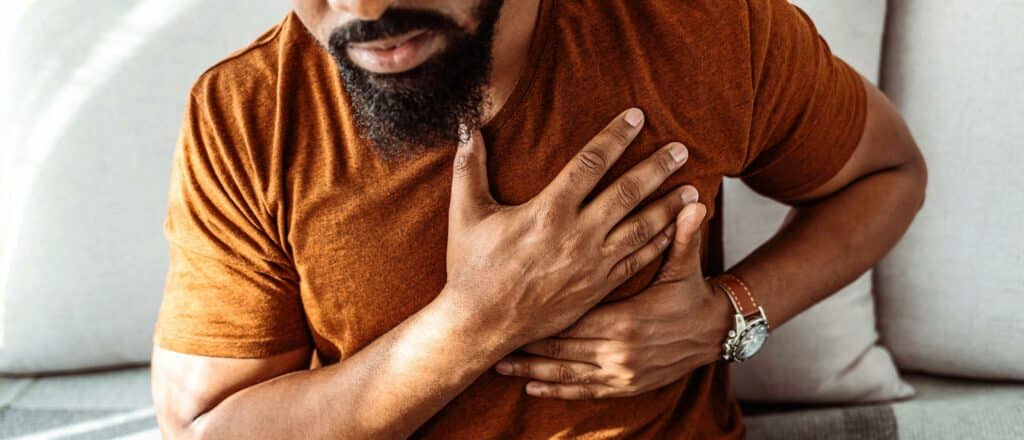That Chest Pain Might Be This, Not A Heart Attack
- By Elizabeth Narins
- Medically reviewed by Nick Dahl, D.O
- April 8, 2022
Fast Facts
- Chest pain from anxiety can feel like a weight is pushing on the chest. It may be accompanied by chest tightness and heavy breathing.
- The pain can feel similar to a heart attack, so if you are in doubt, go straight to the emergency room.
- Strategies for reducing anxiety, including grounding yourself in the moment and within your body, can help anxiety-related chest pain dissipate.
If you’ve ever felt your chest tighten in response to stressor, you’re not alone: Chest pain is the second most common reason for adults to present to the emergency department. But often, the pain is not related to heart problems. Anxiety contributes to up to 40 percent of the chest pain felt by emergency room patients, according to an observational study published in The American Journal of Cardiology (1).
Men may be particularly prone to feeling such tightness in the chest during a minor crisis. “Men tend to symptomize emotional distress through physical sensations, so instead of admitting that they are hurt or angry or struggling with working from home with their kids, they’ll say, ‘My head is killing me,’ or ‘I have tension in my shoulders,’” says Debra Kissen, Ph.D., chief executive officer of Light On Anxiety CBT Treatment Centers in Illinois and co-chair of the Anxiety and Depression Association of America’s public education committee. Or: “I have chest pain.”
That’s not to say all chest pain is in your head—or benign. “Heart disease is the number one killer of men and women in the United States. We don’t want to wrongly tell a patient that their chest pain is anxiety and miss the heart attack,” says Martha Gulati, M.D., cardiologist, and chair of the 2021 American College of Cardiology/American Heart Association Chest Pain Guidelines. Anxiety, she says, is a diagnosis of exclusion, meaning it’s determined to be the cause of chest pain when other probable medical explanations have been ruled out.
Here’s what else you need to know about anxiety-induced chest pain—and how to keep your body’s stress response under control.
What Is Anxiety?
Imagine you’re sitting in the back of an Uber as your driver creeps above 90 mph. The average person would feel uncomfortable. “Anxiety is the physiological state of the brain and body being on alert for potential danger,” says Kissen. The body’s sympathetic nervous system is triggered to prepare for physical activity. Known as the “fight or flight” response, it’s your body’s way of preparing to either book it or muscle up to fend off a real (or imagined) threat.
During the fight or flight response, your heart rate increases to send oxygenated blood to your major muscle groups, digestion is slowed to divert energy elsewhere (say, your legs, so you can run), and your sweat glands act up to help cool the body. Sometimes, you may notice that your hands feel cold and tingly. “It’s because we don’t need fine motor skills at that moment to navigate an immediate threat,” Kissen explains.
A little bit of anxiety can be a good thing since it prepares you for life’s uncertainties. But when your body’s natural alert system is prone to frequent false alarms, anxiety becomes less valuable and more disruptive. The resulting distress can interfere with your ability to function normally. An even bigger buzzkill? “It’s hard to enjoy your life during moments you spend worrying that you’re dying,” Kissen says.
Related: Is Low Testosterone Causing Your Anxiety?
How Can Anxiety Cause Chest Pain?
“Physiologically, we know that stress or fear can cause your heart to race and body to sweat,” Gulati says. “But the cause of chest pain in anxiety-provoking situations isn’t entirely clear.”
Here’s what we do know: In moments of extreme or even average stress, “the body tenses up to protect the heart and other vital organs like a shield,” which can feel uncomfortable, explains Kissen. An increase in heart rate may also lead to heavier breathing, which can contribute to chest tightness.
This kind of discomfort can induce fear that amplifies the body’s natural stress response in those who are prone to health anxiety. “You may think, ‘This is it, this is the sign I’m dying,’” Kissen says. And while she’s careful not to dismiss her clients’ physical symptoms, fear and anxiety over symptoms can contribute to the cycle of panic. “Fear creates more fear,” she says.
What Does Chest Pain From Anxiety Feel Like?
Although the experience is subjective, some men describe chest pain from anxiety as an elephant standing on their chest, Kissen says. If heavy breathing or hyperventilation accompany the chest tightness, it may also feel like you can’t get enough air.
How Common Is Chest Pain From Anxiety?
In a word: very. The average person feels some chest sensation when anxiety strikes, says Kissen. For some, this can be scary enough to warrant a hospital visit: Roughly 50 percent of people who show up in emergency rooms with chest pain unrelated to a cardiac event also have a diagnosed panic disorder while up to 33 percent have generalized anxiety, according to a 2022 Health and Quality of Life Outcomes study (2).
“People tell me, I’d hate to bother you if there’s ‘nothing’ going on, but you’re never bothering us,” Dr. Gulati says. “These are the types of things that are meant to be seen in the emergency room. This is why we’re here.”
How Long Does Anxiety-Related Chest Pain Last?
With the right response strategy (some ideas below), anxiety-related chest pain can vanish in a snap—but it passes more quickly when you can come to terms with it, Kissen says. “When you fight against your body to stop feeling what it’s feeling, you’re going to feel it more,” she warns. And like many physical symptoms that originate in our heads, “you can bring it on by trying to determine if it’s there,” she adds.
If the pain lingers after the stressful event has passed, be safe and head to the ER.
Some men describe chest pain from anxiety as an elephant standing on their chest.
Anxiety Chest Pain vs. Heart Attack
Physiologically, anxiety-induced chest pain couldn’t be more distinct from the mechanisms that lead to a heart attack. The thing is, “sometimes, the symptoms are the same,” Gulati says. “It can be hard for both the patient and healthcare community to tell [what is going on].”
So what is the difference between anxiety- and cardiac event-induced chest pain? When there’s a blockage in the heart (the main cause of heart attacks), you may feel central chest pain, tightness, squeezing, heaviness, or pressure that can radiate to the back, Gulati says.
Meanwhile, stabbing, tearing, burning, or fleeting pain that occurs shortly after a stress-provoking event or scare could be due to anxiety. And “if your symptoms feel worse when you think about them, it could be anxiety,” Kissen adds.
Regardless of the root of your discomfort, experts agree: it’s a bad idea to play doctor when you’re stuck in the throes of it. If you’re concerned, see a doctor.
Related: 10 Health Stats You Should Start Tracking ASAP
What Should I Do If I Experience Anxiety Related Chest Pain?
While anxiety-induced chest pain is fairly common and can be fleeting, “it’s best to rule out anything medical to make sure there isn’t something else going on if you’re experiencing moderate to severe distress more often than you’d like,” Kissen says. After all, that “something else” could be as benign as heartburn from the chili you ate at lunch, or as serious as a heart attack that requires immediate attention.
If you’ve been diagnosed with anxiety or panic attacks and feel sure your chest pain is related, refer to this playbook the next time severe anxiety strikes:
Look for patterns
“You want to notice when you’re experiencing these sensations and what happened right before to identify any thought-patterns that might be associated with these feelings,” Kissen suggests. This way, when chest pains creep in, you can contextualize them and remind yourself what’s really going on—before you spiral into fears over a heart attack.
Return to the present
Recognizing your sensations—chest pain, yes, but also the bitterness of your coffee and the humming of the radiator—can help bring your brain back to the present, a reminder that there is no real danger right this moment. Making further observations can help bring your brain back to the present. “When your mind feels like it needs to tend to this false alarm, you want to yank it back,” Kissen says, acknowledging it can take some practice.
Do a body scan
“Even if I’m treating someone for a panic disorder, I would never assume their symptoms are related to a panic attack,” Kissen says. “I’ll ask, can you walk right now? Can you put on your coat? Can you function, even if it feels like you can’t?” Ask yourself the same questions and you may avoid a superfluous hospital run.
When to See a Doctor For Chest Pain
“If you’re experiencing chest pain and haven’t been diagnosed with panic attacks, the recommendation is to be seen as quickly as possible in the emergency department,” says Gulati. In the emergency room, the vast majority of chest pain complaints aren’t due to cardiac events, she says—and that’s ok. “Let us make the diagnosis,” she says.
There, a medical professional will ask about your medical and family history; conduct a physical exam; order an electrocardiogram (EKG), which checks the electrical activity of the heart; and check the blood for biomarkers indicating reduced blood flow to the heart, according to Gulati.
In the worst-case scenario, you’ll be sent home with a referral to see your primary care physician, psychologist, or psychiatrist to address your underlying anxiety.
“If nothing is physiologically wrong, it’s about tolerating the chest pain,” says Kissen, who recommends giving cognitive therapy a shot for at least eight weeks. With the help of a professional, you can get a grip on how your body responds to stress and begin to alleviate the fear of that response, which can help you from spiraling the next time chest pain strikes.
Your therapist may initiate some interoceptive exposure exercises that trigger the uncomfortable sensations of anxiety by, say, having you run up and down a flight of stairs. This teaches your brain to stop associating those sensations with danger. “It breaks the fear cycle,” Kissen explains.
If you don’t have the time or interest to engage in therapy, talk to a primary care physician about anti-anxiety medication. “Sometimes people feel ashamed when they can’t figure things out themselves,” says Kissen, “but we all deserve tools and support.”
The Bottom Line
References:
1.Paul I. Musey Jr, Roma Patel, Colin Fry, Guadalupe Jimenez, Rachael Koene, Jeffrey A. Kline,
Anxiety Associated With Increased Risk for Emergency Department Recidivism in Patients With Low-Risk Chest Pain, The American Journal of Cardiology, Volume 122, Issue 7, 2018, Pages 1133-1141,
ISSN 0002-9149, https://doi.org/10.1016/j.amjcard.2018.06.044.
2. Hamel, S., Denis, I., Turcotte, S. et al. Anxiety disorders in patients with noncardiac chest pain: association with health-related quality of life and chest pain severity. Health Qual Life Outcomes 20, 7 (2022). https://doi.org/10.1186/s12955-021-01912-8







